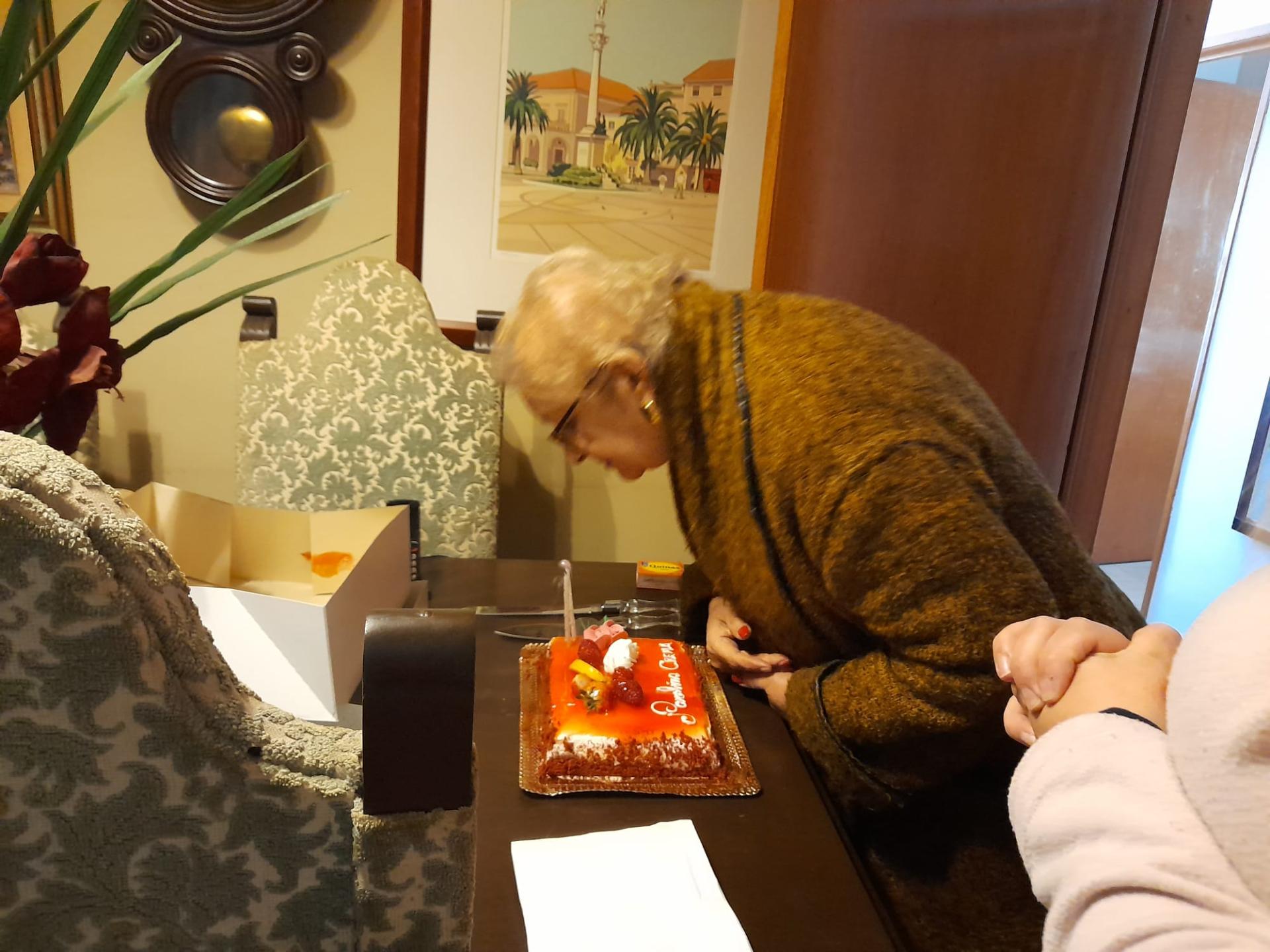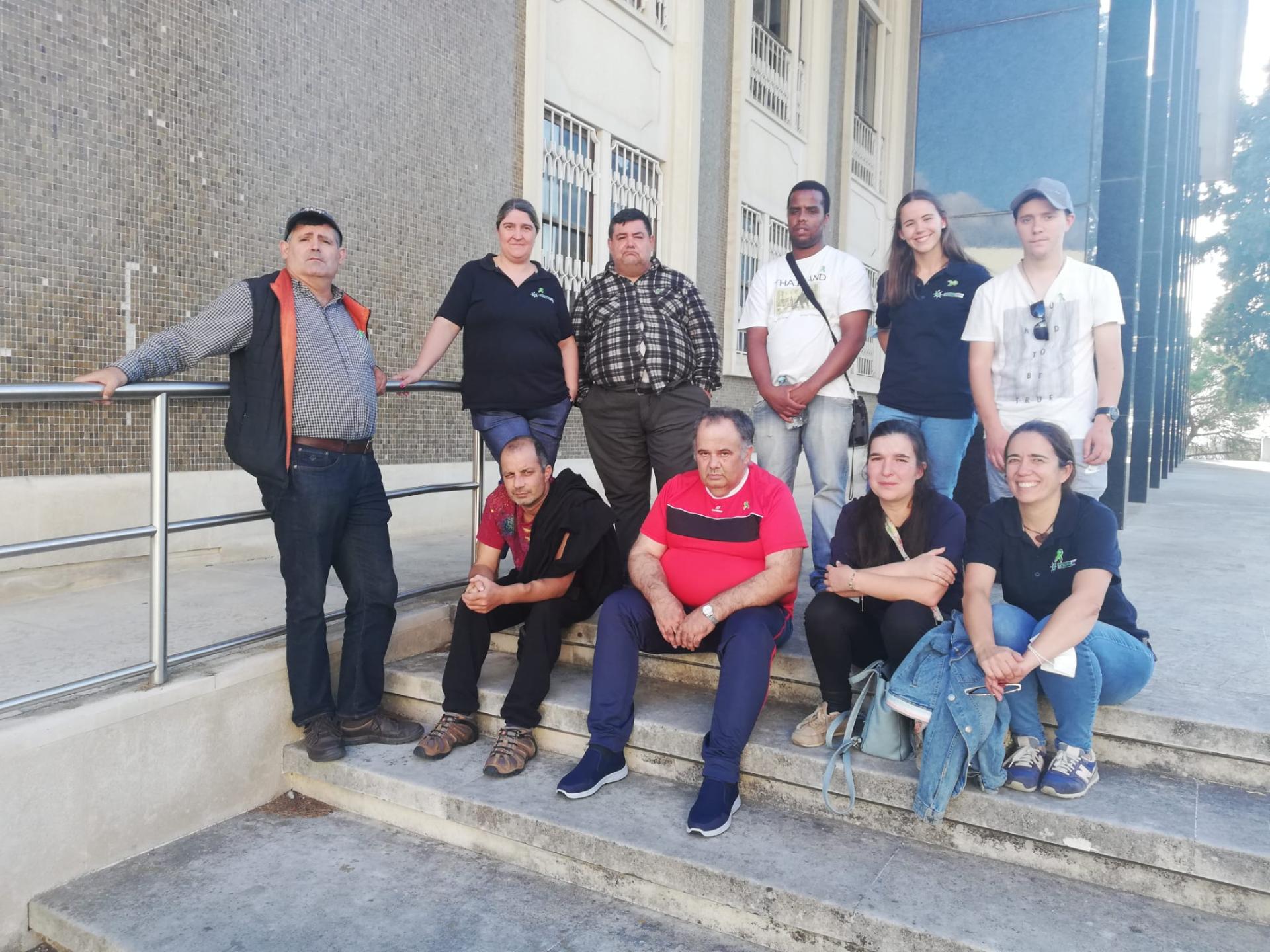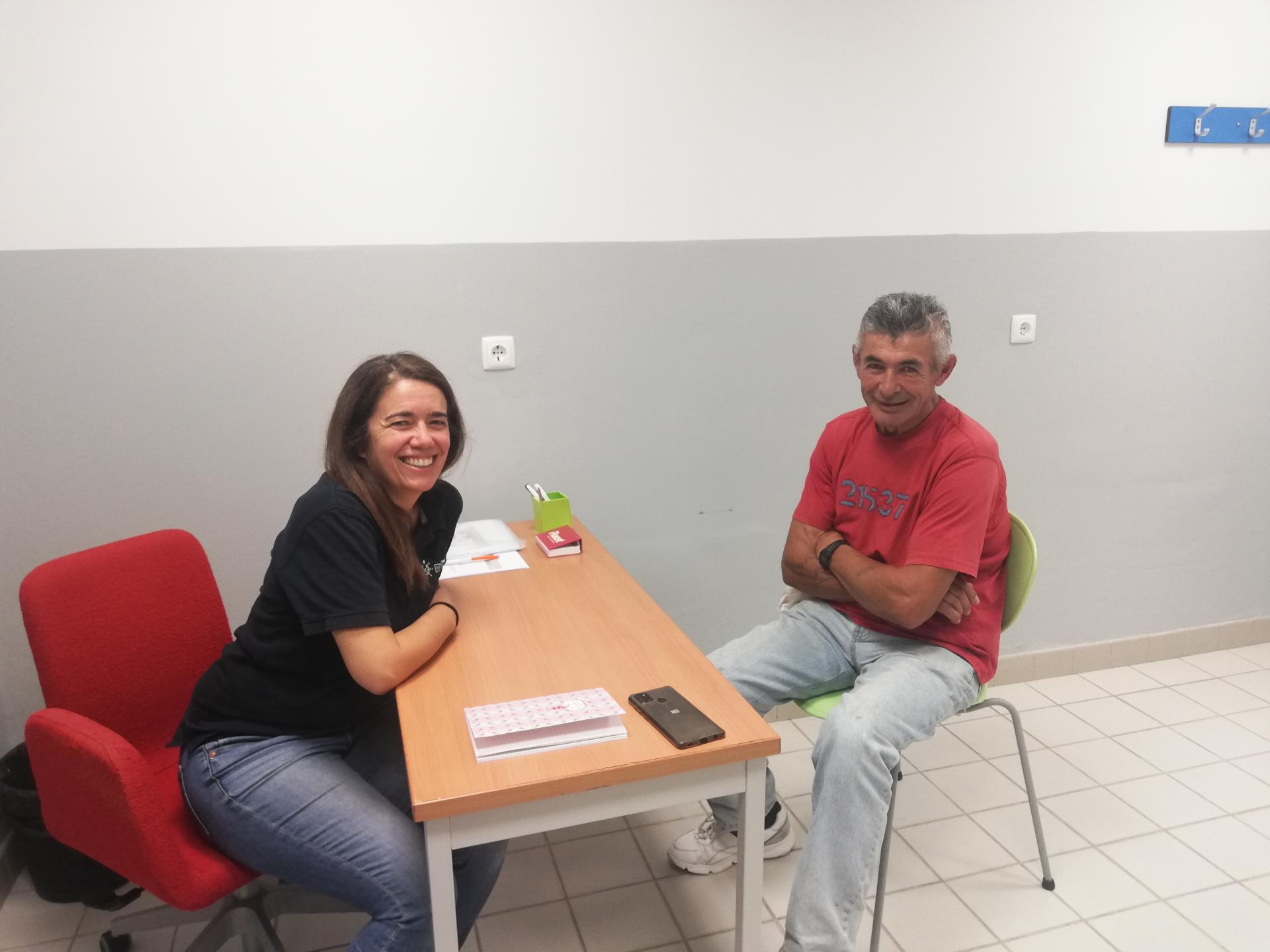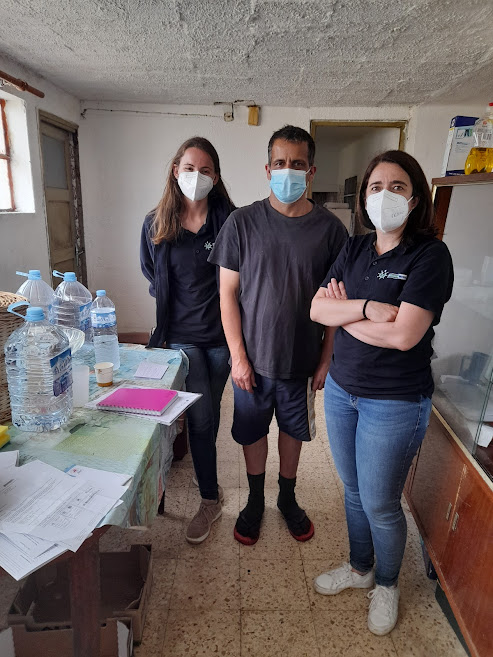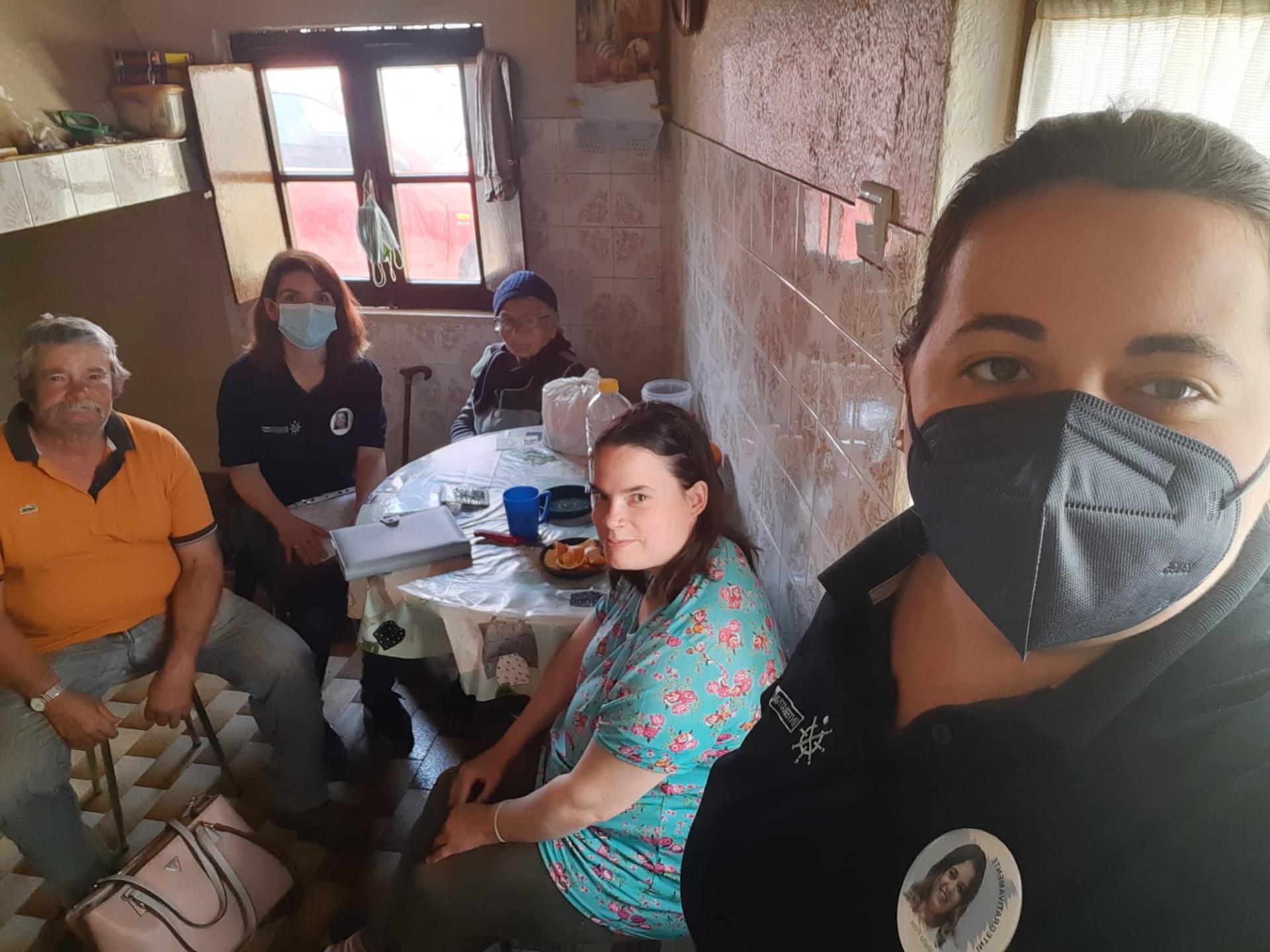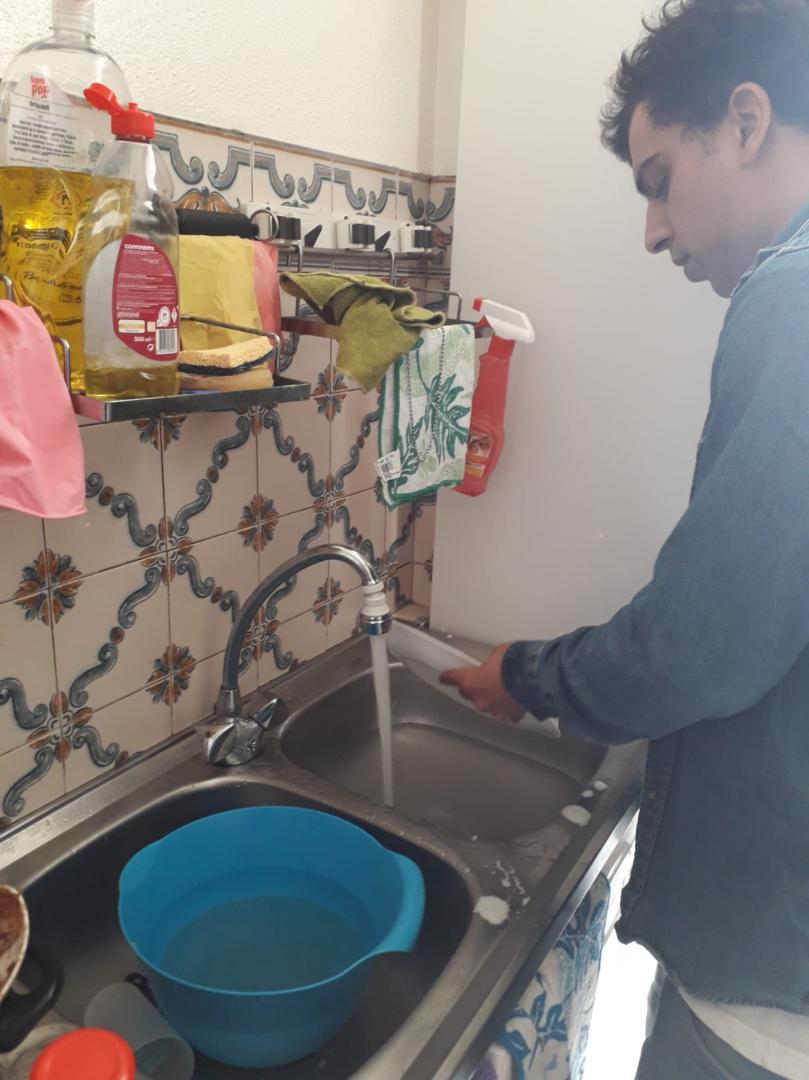Empower You-Skills training programme
Basic information
Project Title
Empower You-Skills training programme
Full project title
Home-based personal and social skills training aimed to empowerment people with mental illness
Category
Prioritising the places and people that need it the most
Project Description
The personal and social skills training program promotes the training and empowerment of people with mental illness, enabling them to live autonomously and within their community. It is based on training in daily living and instrumental skills with a view to promoting quality of life and reducing the burden on informal caregivers.
Geographical Scope
Regional
Project Region
Middle Tagus (Médio Tejo): is a Portuguese sub-region located in the center of the country, belonging to the Center region. It has a total area of 2,283 km², 228,604 inhabitants in 2021, Portugal
Urban or rural issues
Mainly rural
Physical or other transformations
It refers to other types of transformations (soft investment)
EU Programme or fund
No
Description of the project
Summary
The project consisted of a multidisciplinary intervention to prevent and combat mental illness and caregiver burnout, aggravated by the total lack of interdisciplinary community intervention responses for the rehabilitation of people with serious mental illness. To respond to the intended objective, the project called "IntegrativaMente" has a main activity where the team travels to patients' homes ("minds on the road") in line with other activities such as a mental health literacy program in schools; physical space for sharing knowledge that allows the demystification of mental illness in the community and the training of caregivers, contributing to reducing their burden; “minds on the road” where the team traveled home in poor health or financial circumstances; “Dinâmica IntegrArte” where, associated with spontaneous Artistic Production, full social acceptance was intended, through the sharing of art, produced by the target audience, with the community in general.
The overall objective was to empower and empower people with mental illness and their caregivers through a multidisciplinary intervention that included psychotherapeutic and psychosocial activities, such as:
training in activities of daily living; training in instrumental life activities; therapeutic management (organization of therapy, promotion of adherence to therapy and administration of long-acting neuroleptic therapy); psychological intervention; support in accessing rights and benefits).
It involved 151 people with mental illnesses, aged between 18 and 65, who, in addition to poor care, were isolated.
The specific objectives were: to increase the quality of life and personal and social performance of 60% of people with mental illness and to reduce the burden on informal caregivers by 50%.
The overall objective was to empower and empower people with mental illness and their caregivers through a multidisciplinary intervention that included psychotherapeutic and psychosocial activities, such as:
training in activities of daily living; training in instrumental life activities; therapeutic management (organization of therapy, promotion of adherence to therapy and administration of long-acting neuroleptic therapy); psychological intervention; support in accessing rights and benefits).
It involved 151 people with mental illnesses, aged between 18 and 65, who, in addition to poor care, were isolated.
The specific objectives were: to increase the quality of life and personal and social performance of 60% of people with mental illness and to reduce the burden on informal caregivers by 50%.
Key objectives for sustainability
A study coordinated by the World Health Organization (WHO) states that for every euro invested in treating depression or anxiety, four euros are gained in health and work capacity. It also reveals, for the first time, the benefits of investing in treatments for the most common forms of mental illness, both for health and for the economy.
In order to reduce the social problem, the programme has aimed, through the decentralization and proximity of services, to meet people with mental illness and their carers. This promotion of decentralization has allowed care to be provided closer to people and has promoted greater participation by communities, users and families.
In the event of difficulty leaving home or refusal of treatment, the program provided psychotherapeutic support to the patient and psychoeducational support to the caregiver, at home, in order to avoid isolation or exclusion from the care network, preventing crisis situations, decompensation and regression of the mental health state, ensuring the effective and sustainable implementation of this mental health promotion initiative, which acted in the prevention and treatment of these pathologies.
On the other hand, the work carried out (therapeutic management, daily life training, literacy in mental illness, psychoeducation) prevented relapses or acute situations that would require hospitalization and associated resources. The exhaustion felt by the caregivers themselves could trigger serious psychological illnesses, which would also require costs.
In order to reduce the social problem, the programme has aimed, through the decentralization and proximity of services, to meet people with mental illness and their carers. This promotion of decentralization has allowed care to be provided closer to people and has promoted greater participation by communities, users and families.
In the event of difficulty leaving home or refusal of treatment, the program provided psychotherapeutic support to the patient and psychoeducational support to the caregiver, at home, in order to avoid isolation or exclusion from the care network, preventing crisis situations, decompensation and regression of the mental health state, ensuring the effective and sustainable implementation of this mental health promotion initiative, which acted in the prevention and treatment of these pathologies.
On the other hand, the work carried out (therapeutic management, daily life training, literacy in mental illness, psychoeducation) prevented relapses or acute situations that would require hospitalization and associated resources. The exhaustion felt by the caregivers themselves could trigger serious psychological illnesses, which would also require costs.
Key objectives for aesthetics and quality
The added value of this project in the Middle Tagus (Médio Tejo) region, which will generate a positive social impact, results from the sharing of knowledge that is spread across the various services and that, in isolation, supports people with serious mental illness. Each professional (psychologist, psychiatrist, family doctor, nurse, social worker, etc.) evaluates the patient's progress and presents a solution that is typified by the national health system in their area of intervention.
The work carried out through an intervention close to the home allowed beneficiaries to become more autonomous, rehabilitate their relational, personal and domestic organization skills, help them access rights and resources in the community and promote greater social participation. In this way, we consider that the project contributed to improving the well-being and quality of life of the target audience in several aspects, as also verified by the final impact assessment. Help with therapeutic management at home also contributed to greater medication adherence on the part of recipients, preventing crisis situations, decompensation and regression of health status, thus avoiding hospitalizations and the costs associated with them. The intervention with caregivers in the home context also allowed the promotion of more adaptive coping strategies on their part, greater knowledge of the disease and a reduction in the burden felt in the role of caregiver.
It was found that 90 beneficiaries showed improvements in both areas, meaning that the result indicator stipulated for the project was met. The results are very positive, considering that even a small improvement can mean a lot to the person and their family in terms of quality of life and functionality.
The work carried out through an intervention close to the home allowed beneficiaries to become more autonomous, rehabilitate their relational, personal and domestic organization skills, help them access rights and resources in the community and promote greater social participation. In this way, we consider that the project contributed to improving the well-being and quality of life of the target audience in several aspects, as also verified by the final impact assessment. Help with therapeutic management at home also contributed to greater medication adherence on the part of recipients, preventing crisis situations, decompensation and regression of health status, thus avoiding hospitalizations and the costs associated with them. The intervention with caregivers in the home context also allowed the promotion of more adaptive coping strategies on their part, greater knowledge of the disease and a reduction in the burden felt in the role of caregiver.
It was found that 90 beneficiaries showed improvements in both areas, meaning that the result indicator stipulated for the project was met. The results are very positive, considering that even a small improvement can mean a lot to the person and their family in terms of quality of life and functionality.
Key objectives for inclusion
People with mental illness, when left unattended, will aggravate their problem, with worsening states of depression, psychosis or dementia, leading to hospitalization and, in extreme cases, even suicide. On the side of the caregivers, there is extreme pressure and fatigue, with a lack of answers to support mental illness. This problem has been further exacerbated by the COVID-19 pandemic, which has forced successive compulsory lockdowns with impositions of social distancing, conditioning the search for health responses and the aggravating suspension of day care centers, which have left many of their users without active supervision.
Recent studies show that psychiatric disorders and mental health problems have become the main cause of disability and mobility in today's societies, a fact that has justified increasing concern about the organization of responses in this area, due to both the growing number of cases, even at a young age, and the lack of family support.
In this way, this project has played an important role in reducing the target group's identified social problems and consequent poor institutional care, through the decentralization and proximity of services, meeting the needs of people with mental illness and their carers. This promotion of decentralization will allow care to be provided closer to people and will facilitate greater participation by communities, users and families.
Recent studies show that psychiatric disorders and mental health problems have become the main cause of disability and mobility in today's societies, a fact that has justified increasing concern about the organization of responses in this area, due to both the growing number of cases, even at a young age, and the lack of family support.
In this way, this project has played an important role in reducing the target group's identified social problems and consequent poor institutional care, through the decentralization and proximity of services, meeting the needs of people with mental illness and their carers. This promotion of decentralization will allow care to be provided closer to people and will facilitate greater participation by communities, users and families.
Results in relation to category
96 beneficiaries achieved improvements in Quality of Life, assessed by the WHOQOL-BREF scale. We understand by improvement in Quality of Life, the improvement of at least 1 of the 4 domains that the scale is available (as long as the remaining domains are maintained and not presented are included); 100 beneficiaries achieved improvements in terms of Personal and Social Performance, assessed using the PSP Scale; 90 beneficiaries achieved improvements in both domains (Quality of Life and Personal and Social Performance).
The results presented are in line with the project's objectives (to improve quality of life and personal and social performance in at least 83 beneficiaries with mental illness). It was found that 90 beneficiaries achieved improvements in both domains, which means that the outcome indicator stipulated for IntegrativaMente was met. The results are very positive, bearing in mind that even a small improvement can mean a lot to a person and their family in terms of quality of life and functionality. Sometimes it can mean a breath of fresh air not only for people with mental illness, but especially for their families. Many families lack support and experience difficulties for years due to a lack of answers, a lack of knowledge and economic issues. What statistically turns out to be a small number, qualitatively can change lives.
What's more, the project only lasted 16 months, which could mean more improvements in the long term.
The results presented are in line with the project's objectives (to improve quality of life and personal and social performance in at least 83 beneficiaries with mental illness). It was found that 90 beneficiaries achieved improvements in both domains, which means that the outcome indicator stipulated for IntegrativaMente was met. The results are very positive, bearing in mind that even a small improvement can mean a lot to a person and their family in terms of quality of life and functionality. Sometimes it can mean a breath of fresh air not only for people with mental illness, but especially for their families. Many families lack support and experience difficulties for years due to a lack of answers, a lack of knowledge and economic issues. What statistically turns out to be a small number, qualitatively can change lives.
What's more, the project only lasted 16 months, which could mean more improvements in the long term.
How Citizens benefit
The programme was aimed at the identified target group of 150 people with mental illness, aged 18 or over, and their carers.
Aged 18 or over and their carers who, in addition to poor institutional support, were in a situation of isolation. This fact completely inhibits the reintegration and recovery of these people, all the more so because the Middle Tagus (Médio Tejo) region lacks properly articulated strategies to promote the prevention and monitoring of mental illness.
The initiative was also aimed at carers, as a significant number of studies on the families of people with mental illness point to the importance of organising mutual aid groups to support each other and develop other support resources aimed at their specific needs. It was essential to involve the family in the defence of the rights of people with mental illness, both in terms of fundamental rights and the right to an active and full community life.
This programme is aimed not only at patients and their informal carers, but also at the community, insofar as it aims to promote the decentralisation of care, bringing it closer and making communities more aware of the problems faced by these patients and their families, combating the associated stigma.
Aged 18 or over and their carers who, in addition to poor institutional support, were in a situation of isolation. This fact completely inhibits the reintegration and recovery of these people, all the more so because the Middle Tagus (Médio Tejo) region lacks properly articulated strategies to promote the prevention and monitoring of mental illness.
The initiative was also aimed at carers, as a significant number of studies on the families of people with mental illness point to the importance of organising mutual aid groups to support each other and develop other support resources aimed at their specific needs. It was essential to involve the family in the defence of the rights of people with mental illness, both in terms of fundamental rights and the right to an active and full community life.
This programme is aimed not only at patients and their informal carers, but also at the community, insofar as it aims to promote the decentralisation of care, bringing it closer and making communities more aware of the problems faced by these patients and their families, combating the associated stigma.
Physical or other transformations
It refers to other types of transformations (soft investment)
Innovative character
The IntegrativaMente Programme has established itself as an innovative and differentiating project in response to a worrying and dramatic diagnosis that aims to provide a local service, working with the experience of a technical team and leveraging partnerships to respond to a social problem in an articulated, structured, multifaceted and networked way through partnerships. This initiative is innovative because:
A solution is designed that is capable of tackling an existing problem which, in turn, is not being addressed by conventional social and public health programmes;
It is based on the introduction of a neighbourhood service, with the creation of the necessary synergies for the development of autonomous inter-help networks;
it provides a personalised and integrative response to the prevention, detection, support and monitoring of mental illness in the Middle Tagus (Médio Tejo) region, a personalised initiative in that the service is face-to-face, at home, close to and adapted to the beneficiaries. Integrative because it allows the beneficiaries and carers themselves to actively participate in the solutions, with psychoeducational and psychosocial interventions;
It is based on the principle of empowering people with mental illness, enabling them to achieve greater autonomy and inclusion in their community;
Testing a good practice with good results indicates that it should be replicated as public policy.
Existing public responses are based on treating the pathology and symptoms from a solely pharmacological point of view.
The programme also aimed to encourage adherence to psychotherapeutic treatment, in close proximity to the multidisciplinary team, considering the intervention unique, unrepeatable and individual for each patient, by triggering recovery and empowerment in them, as mentioned above.
IntegrativaMente's innovation does not stop at bringing together the specific conditions of continuous patient counselling.
A solution is designed that is capable of tackling an existing problem which, in turn, is not being addressed by conventional social and public health programmes;
It is based on the introduction of a neighbourhood service, with the creation of the necessary synergies for the development of autonomous inter-help networks;
it provides a personalised and integrative response to the prevention, detection, support and monitoring of mental illness in the Middle Tagus (Médio Tejo) region, a personalised initiative in that the service is face-to-face, at home, close to and adapted to the beneficiaries. Integrative because it allows the beneficiaries and carers themselves to actively participate in the solutions, with psychoeducational and psychosocial interventions;
It is based on the principle of empowering people with mental illness, enabling them to achieve greater autonomy and inclusion in their community;
Testing a good practice with good results indicates that it should be replicated as public policy.
Existing public responses are based on treating the pathology and symptoms from a solely pharmacological point of view.
The programme also aimed to encourage adherence to psychotherapeutic treatment, in close proximity to the multidisciplinary team, considering the intervention unique, unrepeatable and individual for each patient, by triggering recovery and empowerment in them, as mentioned above.
IntegrativaMente's innovation does not stop at bringing together the specific conditions of continuous patient counselling.
Disciplines/knowledge reflected
With the aim of reducing the impact of mental disorders and contributing to the prevention, detection, support and monitoring of mental illness in the Middle Tagus (Médio Tejo) , through this openness to the community, the programme offered flexible support according to the requests and coordination defined by the Médio Tejo Hospital Centre, Local Health Units, the Social Network, the Médio Tejo Intermunicipal Community, as well as the municipalities and parish councils that make up the network.
The added value that has generated a positive social impact in the Middle Tagus (Médio Tejo) region has resulted from the pooling of knowledge that is scattered throughout the various services and which, in isolation, accompanies people with serious mental illness. Each professional (psychologist, nurse and social worker) assessed the patient's progress and, in partnership with the beneficiary themselves, defined a solution within their area of intervention.
By making services available to patients and their families, the focus of this project is not only on solving the problem, but also on preventing the specific vulnerability associated with this target group.
Multidisciplinary technical team (2 social workers, 2 psychologists, 1 nurse specialising in mental health); External auditors (Porto Higher School of Nursing).
The added value that has generated a positive social impact in the Middle Tagus (Médio Tejo) region has resulted from the pooling of knowledge that is scattered throughout the various services and which, in isolation, accompanies people with serious mental illness. Each professional (psychologist, nurse and social worker) assessed the patient's progress and, in partnership with the beneficiary themselves, defined a solution within their area of intervention.
By making services available to patients and their families, the focus of this project is not only on solving the problem, but also on preventing the specific vulnerability associated with this target group.
Multidisciplinary technical team (2 social workers, 2 psychologists, 1 nurse specialising in mental health); External auditors (Porto Higher School of Nursing).
Methodology used
This activity consisted of the follow-up, monitoring and overall evaluation of the project's impact, carried out by external auditors - Porto Higher School of Nursing- through a partnership. This monitoring was carried out by applying the project's evaluation scales (WHOQOL-BREF Quality of Life Scale and PSP Personal and Social Performance Scale).
This activity has been underway since the start of the project, with the scales being applied to each beneficiary at 3 different times: (1) at the start of the intervention, during one of the first home visits; (2) at an intermediate stage of the project, only for beneficiaries whose intervention time was considered sufficient for them to be applied (at least 3 months of intervention since the initial scales were applied); and (3) at the end of the project, or at the end of the intervention for beneficiaries who were discharged before the end of the project. Thus, at the end of the Integrativamente Programme, the impact assessment was carried out by the external auditors by comparing the results of the initial scales and the final scales. It is important to highlight that the IntegrativaMente Program followed 151 beneficiaries until June 2023, with 23 beneficiaries not involved in the final evaluation phase, for different reasons: death during the course of the intervention (2 beneficiaries), hospitalization due to worsening of symptoms (2 beneficiaries) and for having recently joined the project (19 beneficiaries). It was considered that the beneficiaries who took part in the project in the months of May and June 2023 did not complete sufficient intervention time, in order to compare results between initial and final scales. For these reasons, of the 151 beneficiaries, only 128 were part of the final impact assessment phase.
This activity has been underway since the start of the project, with the scales being applied to each beneficiary at 3 different times: (1) at the start of the intervention, during one of the first home visits; (2) at an intermediate stage of the project, only for beneficiaries whose intervention time was considered sufficient for them to be applied (at least 3 months of intervention since the initial scales were applied); and (3) at the end of the project, or at the end of the intervention for beneficiaries who were discharged before the end of the project. Thus, at the end of the Integrativamente Programme, the impact assessment was carried out by the external auditors by comparing the results of the initial scales and the final scales. It is important to highlight that the IntegrativaMente Program followed 151 beneficiaries until June 2023, with 23 beneficiaries not involved in the final evaluation phase, for different reasons: death during the course of the intervention (2 beneficiaries), hospitalization due to worsening of symptoms (2 beneficiaries) and for having recently joined the project (19 beneficiaries). It was considered that the beneficiaries who took part in the project in the months of May and June 2023 did not complete sufficient intervention time, in order to compare results between initial and final scales. For these reasons, of the 151 beneficiaries, only 128 were part of the final impact assessment phase.
How stakeholders are engaged
Psychiatry Service at Centro Hospitalar do Médio Tejo (CHMT): It is an unparalleled source that has ignited a connection of diverse and relevant expertise and shared knowledge, with the main goal of improving the quality of life for beneficiaries and their caregivers;
Middle Tagus (Médio Tejo) municipalities: several municipalities have proven to be an important source of referencing as well as impressive partners in providing physical spaces that made the project possible;
Middle Tagus (Médio Tejo) Intermunicipal Community: An unparalleled support, making the project possible through 30% funding. Referring to the significant role in promoting this project and reaching more beneficiaries;
Porto Higher School of Nursing: a partnership which, through the provision of external auditors, made it possible to follow up, monitor and evaluate the overall impact of the project. This monitoring was carried out by applying the project's evaluation scales (WHOQOL-BREF Quality of Life Scale and PSP Personal and Social Performance Scale).
Middle Tagus (Médio Tejo) municipalities: several municipalities have proven to be an important source of referencing as well as impressive partners in providing physical spaces that made the project possible;
Middle Tagus (Médio Tejo) Intermunicipal Community: An unparalleled support, making the project possible through 30% funding. Referring to the significant role in promoting this project and reaching more beneficiaries;
Porto Higher School of Nursing: a partnership which, through the provision of external auditors, made it possible to follow up, monitor and evaluate the overall impact of the project. This monitoring was carried out by applying the project's evaluation scales (WHOQOL-BREF Quality of Life Scale and PSP Personal and Social Performance Scale).
Global challenges
Recent studies demonstrate that psychiatric disorders and mental health problems have become the main cause of disability and morbidity in today's societies, a fact that has justified an increasing concern with the organization of responses in this area, due to both the increasing number of cases, even at young ages, or the lack of family support. This problem became even more acute, with the COVID-19 pandemic that forced successive mandatory confinements with social distancing requirements, conditioning the search for health responses and with the aggravating suspension of activity in day centers, which left many of their users without active surveillance.
One of the causes for the worsening of mental illness is the difficulty in accessing the few local services available to these patients, as well as the total lack of community responses, close to people with mental illness and their caregivers, in some areas. geographical areas of the Middle Tagus (Médio Tejo).
In this way, this project has overcome the difficulty in accessing answers for various beneficiaries. Faced with the difficulty of leaving home or refusal of treatment, this project provided psychotherapeutic support to the patient and psychoeducational support to the carer, at home, in order to avoid isolation or exclusion from the network of care signposted, preventing crisis situations, decompensation and regression of the state of mental health, ensuring the effective and sustainable implementation of this mental health promotion initiative, which will act in the prevention and treatment of these pathologies.
Although community responses do not cover this, people with mental illness continue to need support, as do their carers, making this project essential and a source of quality of life provision.
One of the causes for the worsening of mental illness is the difficulty in accessing the few local services available to these patients, as well as the total lack of community responses, close to people with mental illness and their caregivers, in some areas. geographical areas of the Middle Tagus (Médio Tejo).
In this way, this project has overcome the difficulty in accessing answers for various beneficiaries. Faced with the difficulty of leaving home or refusal of treatment, this project provided psychotherapeutic support to the patient and psychoeducational support to the carer, at home, in order to avoid isolation or exclusion from the network of care signposted, preventing crisis situations, decompensation and regression of the state of mental health, ensuring the effective and sustainable implementation of this mental health promotion initiative, which will act in the prevention and treatment of these pathologies.
Although community responses do not cover this, people with mental illness continue to need support, as do their carers, making this project essential and a source of quality of life provision.
Learning transferred to other parties
This project could be an added value to places that feel a lack of responses from the referenced target audience. In this way, a team that seeks to respond to the needs of people with serious mental illness, who have difficulty leaving home or who refuse treatment, resulting from the lack of interdisciplinary intervention responses. This promotion of decentralization will allow the provision of care closer to people and will facilitate greater participation of communities, users and families, providing psychotherapeutic support to the patient and psychoeducational support to the caregiver, in their home, in order to avoid their isolation, or exclusion from the signalized care network, preventing crisis situations, decompensation and regression of mental health status, ensuring the effective and sustainable implementation of this initiative to promote mental health, which will act in the prevention and treatment of these pathologies.
On the other hand, physical spaces for sharing knowledge and easy access to the community, or for recreational activities that allow the development of socio-emotional skills and enable the patient to integrate into the community.
Through a multidisciplinary team of nurses, social workers, psychologists, occupational therapists, and a periodic assessment of the patients' progress, it could be a project applicable in several locations. A response that proved to be positive and improved the lives of not only people with mental illness, their families, but also the community that witnessed these improvements.
On the other hand, physical spaces for sharing knowledge and easy access to the community, or for recreational activities that allow the development of socio-emotional skills and enable the patient to integrate into the community.
Through a multidisciplinary team of nurses, social workers, psychologists, occupational therapists, and a periodic assessment of the patients' progress, it could be a project applicable in several locations. A response that proved to be positive and improved the lives of not only people with mental illness, their families, but also the community that witnessed these improvements.
Keywords
social skills training
mental illness
adults
promoting quality of life
reducing the burden on informal caregivers

